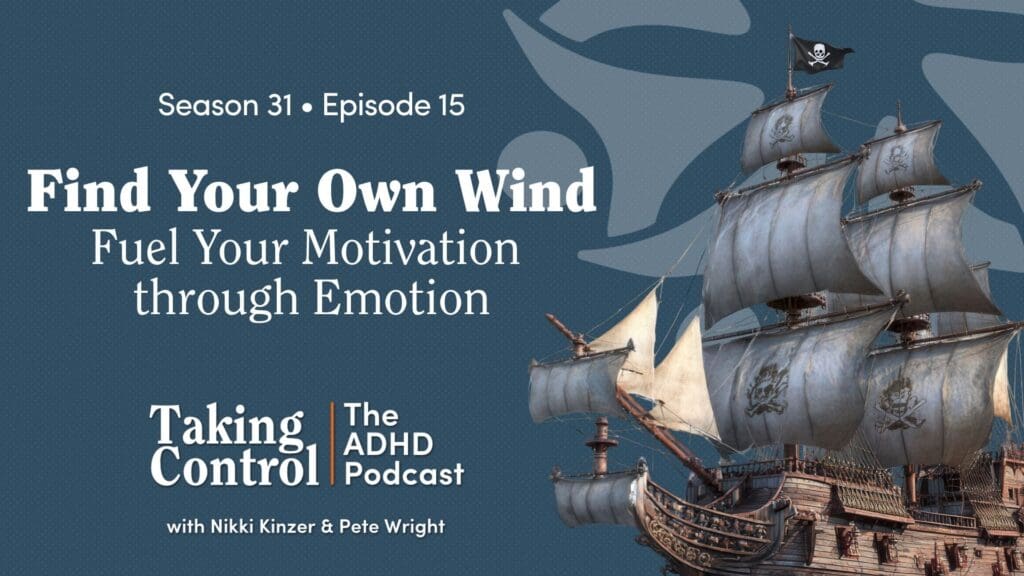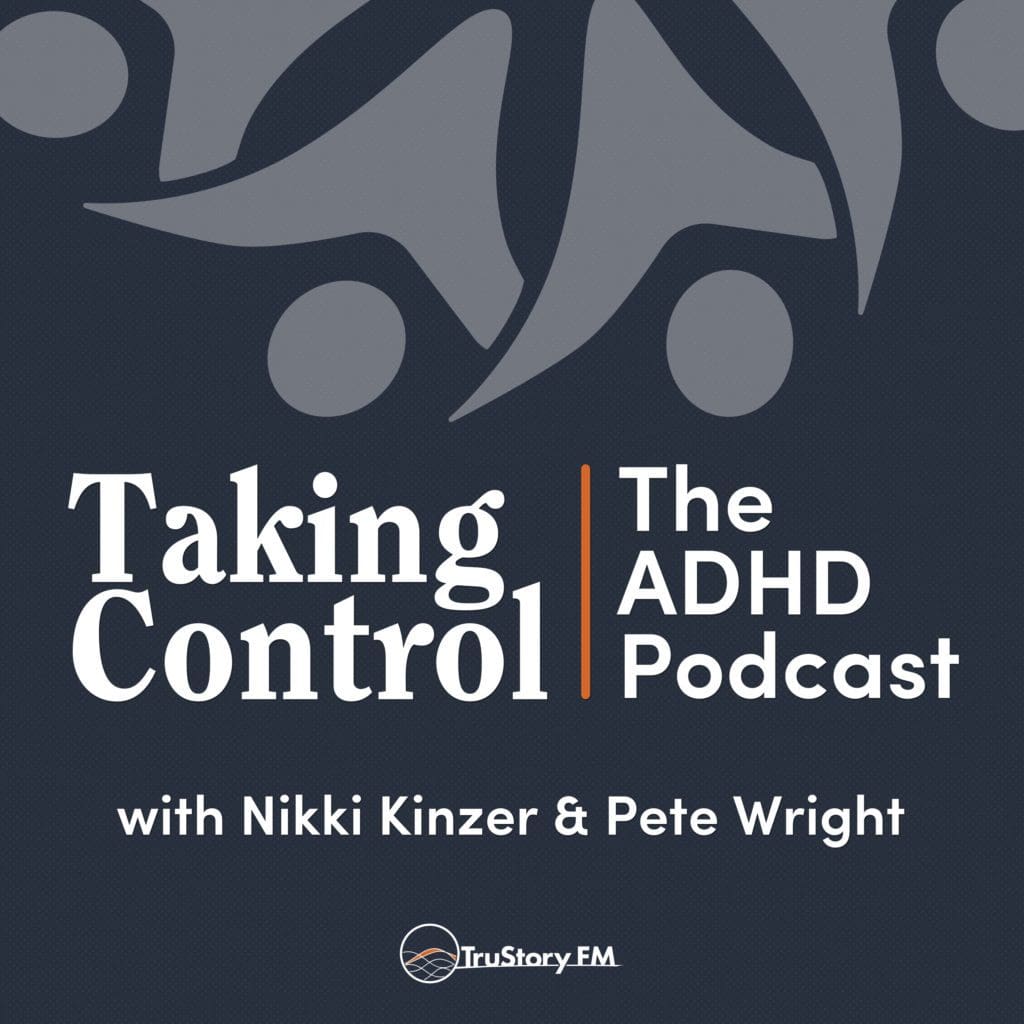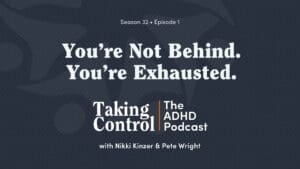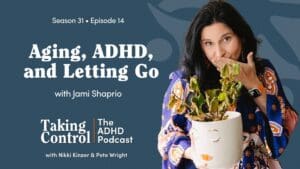Pete Wright
Hello, everybody, and welcome to Taking Control: The ADHD Podcast on TruStory FM. I’m Pete Wright, and I’m here with Nikki Kinzer. Hello, Nikki Kinzer.
Nikki Kinzer
Hello, everyone. Hello, Pete Wright.
Pete Wright
We’re kicking off a show today about emotional planning, and I feel a little bit like this is a spin-off of our tolerations episode—magnified—by conversations you’ve been having. We’re gonna talk about it, but it’s not “emotional planning” the way you’re gonna think.
Nikki Kinzer
Yeah, right.
Pete Wright
That emotional planning means a thing, but it doesn’t mean that thing. So I want you to hang on to that—hang on to that feeling that you think you know what you know, when really you don’t. Oh, this is gonna be great.
Nikki Kinzer
Scrum.
Pete Wright
Today we are talking about emotional planning, and it’s gonna be a fantastic conversation. But before we actually dig in, head over to takecontroladhd.com to get to know us a little bit better. You can listen to the show right there on the site, or subscribe to our mailing list to get a new episode delivered to you each week. You can find us on Facebook, Instagram, Bluesky, or Pinterest at TakeControlADHD.
The best way to connect with us is in the ADHD Discord community. It’s a vibrant, supportive space full of people who get what life is like with ADHD. They share wins and struggles and strategies—and a lot of laughs and love along the way. Join us anytime at takecontroladhd.com/discord.
And here is a great truth: if you’re joining us for the first time… where have you been? Welcome. Water’s warm. This show exists because of our listeners—you—made possible by Patreon. Now, Patreon isn’t a tip jar. It’s the reason we’re able to keep showing up every week. Your support pays for the time, the tools, and the creative energy that go into every single episode. If this show has helped you feel more seen and more capable, or just a little less alone, we’re asking you to become part of the team that makes this possible. You can join us at patreon.com/theADHDpodcast and help us keep building together.
Along the way, you get double-secret and triple-secret channels in our Discord server. You get access to the livestream recordings as we’re here doing them. You can jump in and talk with us during the livestreams and ask us questions—we love that kind of participation. And we love all of you for being part of this community.
All right, Nikki. Emotional planning: using how we feel to fuel what we get done.
Nikki Kinzer
Mm, that sounds so good.
Pete Wright
All right—where did this come from?
Nikki Kinzer
Well, the topic came from a GPS discussion. So GPS is our planning membership that we have at Take Control ADHD. And they were talking amongst themselves after they were done with their planning, of course. People were inspired by our conversation with Nicole Stanley—remember her?—when we were talking about finances and ADHD.
One of the things she talked about was that when goals are emotionally meaningful—when you’re connected to your values, your self-respect, your care, your future self—you’re more likely to follow through, even when motivation dips. And she was talking about that in the financial context. Like, if you’re saving for something and it has high meaning to you, you’re more likely to keep saving for it, right? There’s an emotional connection.
So the question in GPS was: how can we do something similar with our tasks? Because there’s a lot of emotion that comes up around tasks and getting things done—how we feel about those things. We’ve talked about avoidance before, procrastination, all the things ADHDers know all too well.
Pete Wright
For sure.
Nikki Kinzer
So I decided to do a workshop on this for our GPS membership. And Melissa actually said, “You know what? I think this would be a great podcast show,” because it’s definitely something people can relate to.
When I started doing the workshop, the first thing I really wanted to talk about was the reality of ADHD and motivation. Because I think that’s a key point in understanding what’s happening. You can’t necessarily just wake up and all of a sudden want to do that icky task.
Pete Wright
Because I think that would—yeah. Right, right.
Nikki Kinzer
Right? Like, there is emotion around it. And— I can see you’re gonna say something.
Pete Wright
Nikki, I can’t— I’m on the edge of my damn seat.
Nikki Kinzer
I can see it. Go ahead.
Pete Wright
I talked on the Entertainment Clutch this morning about my new favorite show—which is actually a really old show—called Black Sails. Nikki, we are all pirate ships. Sometimes you just can’t sail because there’s no wind. That’s the thing. They just sit for three weeks in the middle of the ocean and bake because there’s no wind.
And sometimes I feel like that with my ADHD. I am in the middle of the sea and there is no wind. I have to do the things that I can do with no wind. And sometimes when the wind picks up, I gotta lean in hard. Hard, hard, hard.
Nikki Kinzer
No wind.
Pete Wright
No wind. I—
Nikki Kinzer
Yes. And it is hard.
Pete Wright
Okay, that’s it. Yes.
Nikki Kinzer
Yes, and I love that you can put that into a picture of us as pirates.
Pete Wright
We are pirates.
Nikki Kinzer
That is great. Yes.
Pete Wright
Oh my God.
Nikki Kinzer
Because what happens is I get asked—and this is the question—“How do I motivate myself to do X?” And it’s the wrong question to ask, because motivation is so tricky with ADHD.
We have to go back to what ADHD is. Initiation—initiating tasks, getting started on things—is an executive function that ADHD brains struggle with. Along with emotional regulation. So you’ve got these two pieces that are already difficult, and then you’ve got feelings around what you’re avoiding.
Pete Wright
Around what you’re avoiding.
Nikki Kinzer
So of course ADHD is going to cause that kind of friction. What’s important, though—and we need to repeat it over and over again—is that this is not about laziness, it’s not about lack of willpower, or that you just don’t care. It’s about your brain needing some extra activation energy to cross that starting line—or, in this case…
Pete Wright
It’s about—
Nikki Kinzer
…get the boat moving a little bit.
Pete Wright
Wind. Get some wind.
Nikki Kinzer
Yeah. Yeah.
Pete Wright
And there are people—we talk about it—the people who say it’s laziness and it’s willpower, those are people who don’t live with ADHD, right? They can muster their own wind, if I may keep it in my pirate vernacular.
Nikki Kinzer
Right, right. Absolutely.
Pete Wright
And that’s a really important thing to recognize: this is one of the areas where we’re just different. And it’s okay.
Nikki Kinzer
You’re different. It’s okay. And it’s also something we want to normalize: needing extra external motivation is not failure. That is okay. You need a deadline. Yes. You need structure. You need to be accountable to somebody else. Because it’s not enough just to be on your own—and that is not failure. It’s information.
Pete Wright
Yeah. It’s that feeling when I can stare at the wall knowing I have to write an email for 45 minutes and nothing comes out, and the second someone comes in the room, I can write like Hemingway.
Nikki Kinzer
Yes, yes.
Pete Wright
Right? You just need something.
Nikki Kinzer
Or you tell somebody, “I’m gonna do this,” and all of a sudden it opens up. So what we want to look at is: this is information. This is something you can learn about yourself—how do I find that traction to get started?
And motivation is emotional. It’s not logical, because we’re human beings. We have feelings. Lots of feelings. We can’t shame ourselves into getting started. And I think that’s a default sometimes for so many ADHDers.
Pete Wright
I was gonna say, we can try.
Nikki Kinzer
Oh, we can try. “I should have done it then,” “I should do this,” “I didn’t do that.” We can shame ourselves all day long, but it’s not helping. With ADHD, motivation doesn’t live in logic—it lives in emotion. So when a task doesn’t feel urgent, it’s not emotionally engaging, it doesn’t light you up in some way—you’re not gonna feel like it’s important because it doesn’t feel real yet. It doesn’t feel that pressure yet.
So the shift we want to talk about with emotional planning is: instead of asking, “How do I motivate myself to do X,” we want to ask, “What kind of support will flip that activation switch for me?” And how can I build that in earlier, so that I’m not waiting and doing the all-nighter? Maybe I’m getting it done with the deadline, but I’m doing it with a lot of stress and pressure and unhealthy habits.
Pete Wright
Right. And that’s hugely important, because the reflection I have on this is: it’s not like, “Okay, first I need an accountability buddy, and then I need a coffee shop on deck, and then I need all the things we’ve talked about—headphones”—which are all great. But they’re not great for everybody. For some people, you might need something completely different.
The muscle we’re trying to build is to figure out—to discern and document—what strategies work for you. What is your wind? What’s your wind that helps you trigger the feelings you need to be able to get the work done?
Nikki Kinzer
And I’m going to say: don’t necessarily believe what you’re telling yourself.
Pete Wright
Yeah.
Nikki Kinzer
And what I mean by that is: I’ll suggest something to someone and say, “Hey, where do you do your best work?” “Well, I definitely do it better if I’m out. I need to be out of the house. I need to go to the coffee shop.” Okay—when was the last time you did that? Silence.
Pete Wright
Yeah, right.
Nikki Kinzer
Okay, so let’s try that. You know it works, so let’s plan to make that happen. So tomorrow you’re not staying at home—you’re intentionally going to the coffee shop.
Or I’ll hear: “Well, it used to work, but now it doesn’t work because I get distracted and I’m looking at all the coffees,” or whatever. Okay. But it did used to work. So don’t automatically believe it doesn’t work anymore either. Let’s try it again—because you never know. Maybe it does.
Or: “Pomodoros never work for me.” Well, okay—maybe it wasn’t the right timing. Can we switch it up a little bit? Don’t just assume something doesn’t work, or that it’s lost its power.
Pete Wright
Right, because maybe it didn’t work before. But one of the things we know is that change is important for us. We need to change things up all the time, because that’s what allows us to see around the next new shiny corner and move.
And I’ve said for years—go back in the transcripts—that my most effective time of day is late afternoon/evening. But I’ve never had control of that time in my home. There was always driving to practice, kid drop-offs. Now they’re gone. And I’m finding my life is changing in dramatic ways because I can take control of it.
I can wake up, do some podcasts in the morning, take a longer lunch, and right around two or three o’clock I can dig in. My wife and I will eat late—we can eat at seven. We can eat when the wind is gone again. But we don’t have to dig into my most productive, creative time. When it comes, it comes naturally. It takes time to learn that—and to massage your life into a way where it’s even possible. It’s been a struggle for decades and now it isn’t, and I’m loving it. But that’s not to say it’s easy.
Nikki Kinzer
We’re going to talk about some ways to bring interest and connection and meaning to your tasks. And I want us to set the tone—the mindset—that we’re not trying to force motivation. We’re trying to invite it in. And that’s just so nice, right? It’s so nice to invite it, rather than forcing it and trying to make yourself do something you don’t want to do.
A lot of these ideas won’t surprise you—you’ve heard them before—but they’re worth repeating, and worth trying again. Trying new things, trying things you tried before but forgot about. That happens a lot.
So if you’re stuck right now—if there’s something you’re avoiding—this is what I want listeners to do, and what I did in the workshop: think about a task you’re avoiding. Hold that space as we talk about ways to bring interest, connection, and meaning. And then do that task today using some of these strategies.
Pete Wright
Yeah, yes.
Nikki Kinzer
It may not complete the task, but let’s get started on it.
Pete Wright
You were so wound up just now I thought you were gonna throw yourself out of your own chair.
Nikki Kinzer
Right? Like, let’s do it.
Pete Wright
You do that task today.
Nikki Kinzer
Let’s do it together.
Pete Wright
Yeah, that was good.
Nikki Kinzer
We’re here to help you do it. So let’s get that toleration checked off.
Pete Wright
Yes.
Nikki Kinzer
So, first: creating interest through novelty or stimulation. This is what your brain needs—something new, something different. How do you change the task you don’t want to do? How can you add novelty?
One of my favorite things: set a short timer and make it a competition. This is how I clean the house. I set a timer for ten minutes and ask, “What can I get done in ten minutes?” It always surprises me. I always feel like unloading the dishwasher is going to take an hour, but it takes minutes. I gamify it. It makes it more fun.
Change your environment—we just talked about this. If you don’t do well working at home, or if the task is work-related, let’s get it out of the environment you’re in. If you work from home, go to a café. If you work in an office, maybe you go to a café anyway.
Co-working with someone—we’re going to talk about accountability, but body doubling is one of my favorite strategies when it comes to doing hard things. You’ve got a person anchoring you, supporting you, who knows you’re doing a hard thing. There’s something about that that’s magic.
Focus music—we had the Brain.fm folks here recently. That can make a huge difference. If you haven’t tried that, try it.
And add sensory elements. Give yourself a cozy drink. Buy yourself a new pen. I have lots of people in GPS who love stationery and pens and stickers—bring that into it. I talked about bringing a candle into my office, but all those women who are 45+ are going to understand: it made me really hot and I had to take the candle out of the office.
Pete Wright
That’s not where I expected it to go, but I should have.
Nikki Kinzer
Yeah, I’m like, I can’t handle this.
Pete Wright
I don’t know if I’ve mentioned this, but I love Prince. And one of the things I got out of my tour of Paisley Park was: Prince had candles everywhere. Broad daylight in the studio—every surface: speakers, control decks, mic stands—everything had candles all over the place. And he would work by candlelight and turn off all the main lights. I low-key love that. I think that’s really cool. I don’t have enough candles, but it makes me think I need to explore some candles. I’m not plagued with the “I get hot” part.
Nikki Kinzer
Yeah, you don’t get the hot flashes.
Pete Wright
So maybe candles are for me.
Nikki Kinzer
So it might work for some of you. Anything that creates interest—just makes it a little shinier.
Connection: building connection through accountability and body doubling. I want to talk a little bit more about that because we do a lot of it in our membership, but also in our community. If you’re part of Discord, in the Take Control ADHD community, we have Accountability Anchor sessions—hosted sessions—and they make such a difference because you’re working with a group of ADHDers who are all doing hard things.
You can check in before you start, tell people what you’re working on, update them at the end—there’s so much value in that. I highly recommend trying it if you haven’t.
And it makes a difference when you just put it out in the universe. All of a sudden it’s like, “Okay, I’ve got that little motivator to actually do it.” And celebrate that.
The last thing I want to talk about is the emotional piece—the alignment around bringing meaning into the task at hand. This can be work-related, home-related, personal. I was thinking: how do I put meaning into doing the dishes? Well, it is nice to have a clean sink. It feels good not to see that mess. It’s less clutter.
So even though the emotional piece is “I don’t want to do this,” the benefit is: it’s gonna look nicer, I’m gonna feel better, it’s not gonna hang over my head. So we want to think: who or what benefits from me doing this? What value of mine does this connect to? And how does this make life easier for future me?
Sunday night after a big dinner, I don’t want to do the dishes. But I know Monday morning, waking up for my work week, it’s going to be nice to have them done. So I have to think about that future me. If you can connect a task to something that matters to you emotionally, your brain doesn’t just see work—it sees meaning.
That’s what Nicole was saying, too, about bringing meaning to financial goals. Then it’s not just a task—it holds value you might not notice at first, but you can bring it forward.
Pete Wright
I have this phone call I have to make. It’s to the insurance company. And I don’t want to do it. I don’t like talking to the insurance adjuster. I find all kinds of ways to mysteriously forget.
But this is a good reminder for me—even as somebody who thinks about tasks a lot. This is a clogging task. Who benefits from me doing this besides me moving it forward? My wife. I know she really wants me to make this call, and I’m the one equipped with the information and the time.
And the value: I like living in a home that is not foundationally broken, that’s safe and clean and dry. I know making this call moves us toward getting the things that are broken fixed. How does this make life easier for future me? When my house is broken, it’s at risk—critters in the sub-basement, flooding, all kinds of damage. Making a simple phone call gets me closer to future me not having to think about those kinds of ingress.
That’s like a mantra. I need to be thinking about that, because that’s going to kick me into making this call when we’re done. Just get it out of the way.
Nikki Kinzer
And that’s exactly it. I was gonna say: we should make that phone call right now.
Pete Wright
Yeah—right. I don’t know that the adjuster would appreciate it.
Nikki Kinzer
And you can do it on air. But think about it: if it was just you and me having this conversation and I said, “Hey Pete, put me on mute and make that phone call right now. I’m going to do some work on the side, and when you’re done, let me know how it goes.” I bet you’re more likely to do it in that moment. Because I’ve opened up space for you to do it, and I’m doing it along with you—although I’m not; I’m working on something else.
Pete Wright
Yeah, for sure.
Nikki Kinzer
There’s magic to that—saying it, doing it, having that person around. So I’m going to follow up with you about this and see if you did it.
And for our listeners: think again about that one thing that’s been on your mind. What can you design—using some of these ideas, or things you’ve done in the past—to help you get started or even check it off? How can you set up future you so you don’t have to rely so much on panic and last-minute pressure?
Pete Wright
Yeah. Because you know who we’re relying on when we let ourselves not do it? We’re relying on past us. Past us is throwing a fit: “I don’t wanna, I don’t wanna, I don’t wanna eat my broccoli, I don’t wanna eat the asparagus, it’s too goo—” thud. We’re having a fit.
And that’s okay. We can have fits. But that doesn’t move us forward. Sometimes you have to have your fit and then figure out the reframe around future you—not past you.
Nikki Kinzer
Right, right.
Pete Wright
Yeah. I like that. That’s helpful.
Nikki Kinzer
There you go.
Pete Wright
Is that it?
Nikki Kinzer
That’s it.
Pete Wright
Did we win the podcast? Look—we did it.
Nikki Kinzer
We did it.
Pete Wright
We thought it was gonna be hard, but we muscled through, and now we have a podcast. Wait—did I press record? Psyche! I did. I did.
Nikki Kinzer
Oh my gosh.
Pete Wright
I did—but look at your face. It was the best. I’ll take that face any day.
Nikki Kinzer
If you didn’t, I would be like, “Nope. We’re rescheduling. We’re not doing this again.”
Pete Wright
Amazing. Thank you so much, everybody, for hanging out with us—for downloading and listening to this show. We appreciate your time and your attention.
Don’t forget: if you have something to contribute to the conversation, we’re heading over to the Show Talk channel in our Discord server. You can join us right there by becoming a supporting member at the Deluxe level or better.
On behalf of Nikki Kinzer, I’m Pete Wright, and we’ll see you right back here next week on Taking Control: The ADHD Podcast.











